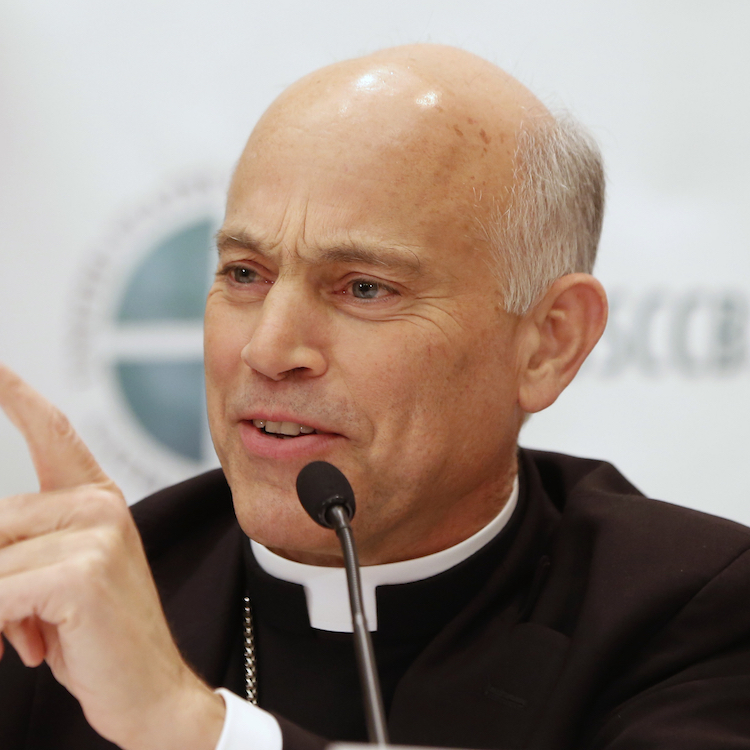In my last essay, I wrote about Bishop Michael Barber, of the Diocese of Oakland, California, and the firestorm that erupted when he tried to insert a morality clause in the contract for diocesan teachers. Barber wanted the employees to live a life that reflected sound Catholic morality, both in school and in their personal lives. It was the word personal that infuriated many teachers, students, and parents, who felt that one’s personal life was none of the bishop’s business.
For a while, Bishop Barber held firm, but, over time, the pressure and negative publicity were too much for him to bear, and so that horrible word personal was dropped from the contract. Score: Dissenters 1, Bishop 0.
Of course, this kind of pusillanimous behavior on the part of Church officials has become far too common. Even so, I made my point, and I moved on.
But, like a zombie who never really dies, the issue has popped up again, this time across the bay in San Francisco. Archbishop Salvatore J. Cordileone has caused a similar kerfuffle by insisting upon a morality clause in the contract that covers 3600 teachers in the diocesan Catholic schools. He expects school employees to “affirm and believe” that “adultery, masturbation, fornication, the viewing of pornography, and homosexual relations” are “gravely evil.” Does this mean in their personal life, also? Of course. Now in a normal world, his expectations would seem to be a no-brainer, but we no longer live in a normal world.
Opposition came quickly from teachers, students and parents. Some Catholic high school students went on Twitter with hashtag #teachacceptance, and it soon became the motto for the dissenters. The message is rather unambiguous: No matter what someone believes and/or acts upon, people should just accept it as a matter of freedom of choice. As one student said, “I was taught this idea, that God gave us this free will to live how we want to, and to make our own decisions . . .” A scary thought is that, given the state of Catholic education today, it’s possible that he was actually taught this nonsense in religion class.
As far as I know, the archbishop is still standing strong. Whether he will have more backbone than his brother bishop is yet to be seen.
But for what it’s worth, I have a suggestion for the dissenters. Why not a different hashtag? How about hashtag #teachrepentance? I know that sounds so judgmental, and perhaps someone will quote for me Pope Francis’s damaging “Who am I to judge?” line, but Jesus, John the Baptist, and Saints Peter and Paul certainly saw the necessity of repentance.
Before Jesus began his public ministry, we hear the words of John at the Jordan: “Repent, for the kingdom of heaven is at hand.” When Pilate sacrificed several Galileans, Jesus said, “Do you think that these Galileans were worse sinners than all the other Galileans, because they suffered thus? I tell you, No; but unless you repent you will all likewise perish.” At Levi’s home, after the Pharisees and Scribes complained about his socializing with tax collectors and sinners, Jesus said, “Those who are healthy do not need a physician, but the sick do. I have not come to call the righteous to repentance but sinners.” When Peter’s discourse at Pentecost cut his listeners to the heart, they asked Peter what they should do. He replied, “Repent, and be baptized every one of you in the name of Jesus Christ for the forgiveness of your sins . . .”
“Repent from what?” one might ask. Jesus was specific: “But what comes out of the mouth proceeds from the heart, and this defiles a man. For out of the heart come evil thoughts, murder, adultery, fornication, theft, false witness, slander.” We also know that Jesus condemned divorce and declared remarriage adultery.
St. Paul did not mince words and condemned those who chose to worship the creature and not the Creator:
For this reason God gave them up to dishonorable passions. Their women exchanged natural relations for unnatural, and the men likewise gave up natural relations with women and were consumed with passion for one another, men committing shameless acts with men and receiving in their own persons the due penalty for their error.
So, let’s see what we have: fornication, adultery, divorce, and homosexual relations. These sins were what Jesus and the apostles expected their listeners to repent from. Jesus did not offer himself on the cross for peccadillos. He shed his blood for major violations of God’s laws. Without sincere repentance, those violations, those mortal sins, will lead to eternal damnation.
The “teach acceptance” crowd probably sees themselves as open and loving to all. But by encouraging people to live immoral lifestyles, they are not loving. Instead, they are indifferent. For they really do not care about the souls of those they support. If they did, they would plead with them to go to confession–before it’s too late. And, now that I think of it, the “acceptance” crowd should go with them.








